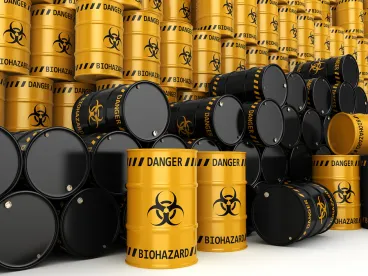Most statements coming out of the U.S. Environmental Protection Agency (EPA), and other federal and state agencies that regulate environmental issues, are currently focused on health and safety issues associated with COVID-19. This includes the identification of disinfectants that work against the virus, statements to reassure the public on the safety of public water supplies, and identifying measures to protect governmental and non-governmental workers around the country. The EPA and Occupational Safety and Health Administration (OSHA) are nevertheless operating under a premise of business as usual when it comes to compliance matters.
The exception is the Pipeline and Hazardous Materials Safety Administration (PHMSA) Office — they have now issued a Notice to gas and hazardous liquid pipeline, underground natural gas storage and liquefied natural gas (LNG) facility operators, as well as PHMSA state partners, explaining that it will stay enforcement of certain PHMSA pipeline safety requirements in light of the President’s March 13, 2020, Declaration of National Emergency relating to COVID-19. The Notice acknowledges that operators may have limited personnel resources in light of the COVID-19 National Emergency and may need to take actions to meet ongoing operational and maintenance needs in a manner that “may not fully meet federal operator qualification (OQ), control room management (CRM), and employment drug testing requirements."
Rulemakings have remained on track, with only a handful of dockets reflecting an extension for public comment periods. Draft Environmental Impact Statements generally remain on track, for the closure of comment periods and compliance obligations set forth in permits, settlement agreements, and compliance orders remain unchanged. Neither the EPA nor OSHA have released public statements, to date, to address or provide any flexibility for compliance with regulatory, administrative or judicially ordered environmental obligations. And, the reality is that most environmental regulations and permits do not contain force majeure provisions that may be used by agencies to excuse noncompliance or extend deadlines.
The counter reality is that site inspections, training, testing, monitoring, reporting, etc. are all becoming increasingly difficult as an ever-increasing number of employees work from home and corporations transition to a skeleton staff. Every day it becomes more difficult for companies to remain in compliance with environmental obligations when faced with supply chain disruptions that impact the delivery of replacement parts, tests, tools, and equipment required for monitoring and compliance. Work stoppages and limited access to testing laboratories or environmental consultants due to travel restrictions, mandatory shutdowns, social distancing, and quarantines are all challenging the ability of corporations to satisfy their environmental obligations. While everyone hopes that agencies will be understanding of delayed or omitted compliance activities during the present crisis, there currently are limited legal or policy assurances in place to alleviate the risk of enforcement or fines for the failure to comply.
In light of this reality, we strongly recommend that companies:
-
identify all upcoming monitoring, testing, training, and reporting obligations and consider reaching out to the appropriate federal, state or local regulators to discuss potential extensions or waivers; or
-
have a plan in place to ensure appropriate actions are taken to meet ongoing compliance obligations.
If compliance obligations are dictated by a consent decree or other settlement document, we recommend analyzing the relevant force majeure provisions and any procedures that may be utilized to obtain relief under such provisions. Such relief may not be straightforward and is certainly not a guarantee. As such early review and proactive actions are recommended to minimize the risk of future enforcement or negative consequence.
As for how receptive federal and state agencies may be to working with companies, we have found regulators generally willing to consider limited compliance extensions, and certain states have begun issuing guidance to assist companies. Those states for which we have seen affirmative actions include:
-
Louisiana: The Louisiana Department of Environmental Quality issued a statewide Declaration of Emergency and Administrative Order providing relief from “the regulatory and proprietary requirements of the Department.” The relief provides a 30-day extension for deadlines between March 19, 2020, and the expiration of the order for the following limited circumstances:
-
Any facility that lacks personnel due to COVID-19, the extension applies to the submission of periodic monitoring and other reports required by permits, regulations, other authorizations, enforcement actions, or settlement agreements, except for monitoring requiring by air permits issued under Title IV or V of the Clean Air Act (CAA) or under the Prevention of Significant Deterioration (PSD) program;
-
Any facility that lacks personnel due to COVID-19, the extension applies to obligation to conduct periodic monitoring required by permits, regulations, other authorizations, enforcement actions, or settlement agreements, except for monitoring requiring by air permits issued under Title IV or V of the CAA or PSD program; and
-
Deadlines to apply for renewal of an existing permit, except for air permits issued under Title V of the CAA, provided, the renewal applications are submitted before the existing permit expires.
-
-
Maryland: The Maryland Department of the Environment issued an executive order that establishes a grace period for state licenses, permits, and registrations that will expire or be up for renewal during the recently declared official state of emergency. After the state of emergency is lifted, renewal deadlines will be extended for another 30 days.
-
Oregon: The Oregon Department of Environmental Quality (DEQ) recently released a statement that it will use “reasonable discretion” in deciding whether to pursue enforcement for non-compliance with DEQ permits, licenses, and certification conditions during the COVID-19 (coronavirus) pandemic. If standard operating and maintenance activities related to DEQ-issued permits, licenses, or certification conditions, are disrupted, DEQ advises businesses to diligently document: (1) the justification for the disruption (e.g., staffing shortages); (2) the impact of the disruption on the facility; and (3) activities the facility is unable to perform. While this guidance demonstrates the agency’s intention to be flexible, it underscores the agencies expectation that businesses continue to make every effort to comply with environmental laws.
-
Pennsylvania: The Pennsylvania Department of Environmental Protection has suspended timeframes for providing permit decisions. According to the Department, permit processing will continue, but decisions are likely to be delayed.
-
Texas: The Texas Commission on Environmental Quality's Office of Compliance and Enforcement (OCE) recently announced it will consider requests for enforcement discretion when a situation directly related to COVID-19 results in an unavoidable issue of non-compliance. Regulated entities should email both OCE@tceq.texas.gov and Ramiro.Garcia@tceq.texas.gov with specific information regarding the situation and maintain records adequate to document activities related to the noted issue of noncompliance, including details of the entity's efforts to comply. The email should contain: (1) a concise statement supporting request for enforcement discretion; (2) anticipated duration for the need for enforcement discretion; and (3) a citation to the regulation or permit provision for which enforcement discretion is requested. OCE monitors the email box daily and will make all efforts to address each request expeditiously.
As COVID-19 continues to cause operational and workforce disruptions, more states are likely to adopt policies to help the regulated community. However, companies should not simply assume that deadline will be forgiven or relief from compliance granted.





 />i
/>i

